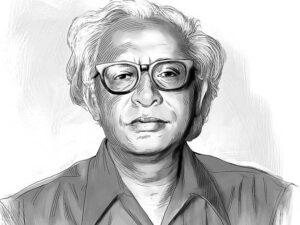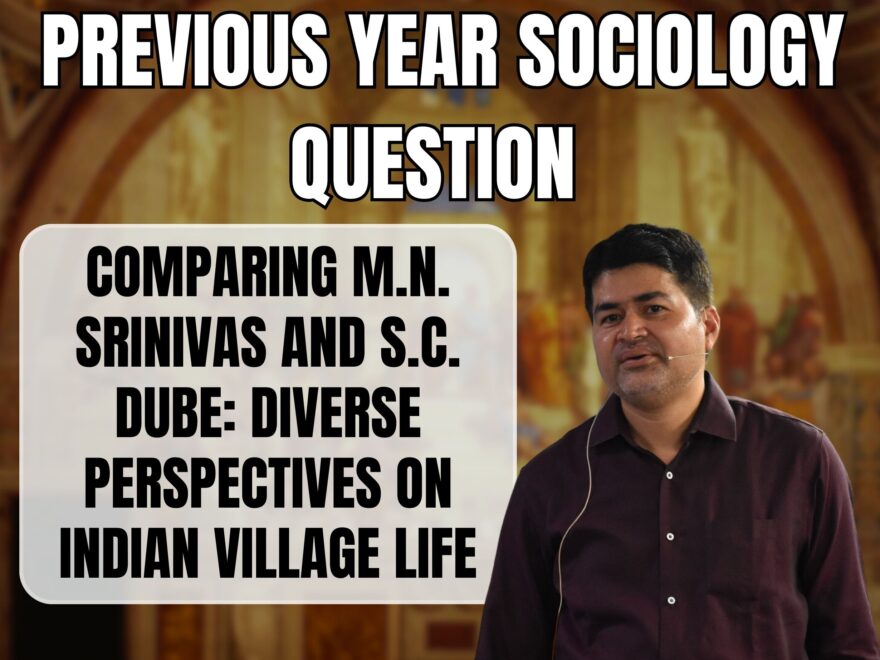With Reference to their Understanding of Indian Village Life, Compare the Perspectives of M.N. Srinivas and S.C. Dube.
(Paper: 2, Section- A, Year 2010, Unit 11: Introducing Indian Society)

With reference to their understanding of Indian village, compare the perspectives of M.N. Srinivas and S.C. Dube.
(20 Marks)
| Introduction: Brief about M.N. Srinivas and S.C. Dube
Main Body: Comparison of M.N. Srinivas and S.C. Dube Conclusion: Significance of their Studies |
Introduction
In the study of Indian villages, scholars M.N. Srinivas and S.C. Dube challenged static notions, offering diverse perspectives on rural dynamics, from culture to economics. They focused on tradition of village studies and structural functionalism to explore complex dynamics of Indian villages.
Main Body
Comparison of M.N. Srinivas and S.C. Dube
- Myth of Self-Sufficiency of Villages:
- Both S.C. Dube and M.N. Srinivas challenged the notion that villages were static and self-sufficient entities.
- Dube’s study of Shamirpet and Srinivas’s study of Ranipura revealed the interconnections between villages and the broader socio-economic and political contexts.
- Scope of Study:
- M.N. Srinivas primarily focused on the cultural aspects of village life, emphasizing concepts like Sanskritisation to explain mobility.
- S.C. Dube, while also considering culture, delved into economic, family, religious, and political structures in addition to caste and religion.
- Factors for Status Differentiation:
- Srinivas emphasized the role of Dominant Caste and Sanskritisation in status mobility.
- Dube identified six factors, including land ownership, government service, age, wealth, distinct personality traits, caste, and religion, as contributors to status differentiation within villages.
- Impact of Change:
- Srinivas explored how Westernization and technological advances were influencing village lifestyles and traditions.
- Dube’s focus was on the impact of state intervention through community development programs in reshaping village dynamics.
- Religion and Culture:
- Srinivas primarily focused on Hindu religion and traditions as the core of village life.
- Dube’s study in Shamirpet highlighted distinctions between Hindu and Muslim religious practices in the same village.
- Political Power:
- Srinivas saw the dominant caste as a major force in the political domain within villages.
- Dube observed that political power in villages was often concentrated in the hands of a few individuals, rather than being distributed along caste lines.
Conclusion
While M.N. Srinivas and S.C. Dube approached the study of Indian villages from different angles, both scholars contributed significantly to dispelling the notion that villages were static and self-sufficient. They provided insights into the complex interplay of social, economic, cultural, and political factors that shape rural life in India.
Related Blogs …
To master these intricacies and fare well in the Sociology Optional Syllabus, aspiring sociologists might benefit from guidance by the Best Sociology Optional Teacher and participation in the Best Sociology Optional Coaching. These avenues provide comprehensive assistance, ensuring a solid understanding of sociology’s diverse methodologies and techniques.
META TAGS:
Indian village life, indian village sociology, indian village as a social system anthropology upsc, village studies in india sociology upsc, characteristics of indian village in sociology, essay on village life in telugu, the soul of india lives in its villages upsc, sociology of rural life in india, significance of village studies in india upsc, significance of village studies in indian sociology, 5 indian sociologist, M.N. Srinivas, S.C. Dube, Indian Villages, Rural India, Sociology, Cultural Perspectives, Social Structure, Political Power, Economic Factors, Dominant Caste, Sanskritisation, Community Development
Why Vikash Ranjan’s Classes for Sociology?
Proper guidance and assistance are required to learn the skill of interlinking current happenings with the conventional topics. VIKASH RANJAN SIR at TRIUMPH IAS guides students according to the Recent Trends of UPSC, making him the Best Sociology Teacher for Sociology Optional UPSC.
At Triumph IAS, the Best Sociology Optional Coaching platform, we not only provide the best study material and applied classes for Sociology for IAS but also conduct regular assignments and class tests to assess candidates’ writing skills and understanding of the subject.
Choose The Best Sociology Optional Teacher for IAS Preparation?
At the beginning of the journey for Civil Services Examination preparation, many students face a pivotal decision – selecting their optional subject. Questions such as “which optional subject is the best?” and “which optional subject is the most scoring?” frequently come to mind. Choosing the right optional subject, like choosing the best sociology optional teacher, is a subjective yet vital step that requires a thoughtful decision based on facts. A misstep in this crucial decision can indeed prove disastrous.
Ever since the exam pattern was revamped in 2013, the UPSC has eliminated the need for a second optional subject. Now, candidates have to choose only one optional subject for the UPSC Mains, which has two papers of 250 marks each. One of the compelling choices for many has been the sociology optional. However, it’s strongly advised to decide on your optional subject for mains well ahead of time to get sufficient time to complete the syllabus. After all, most students score similarly in General Studies Papers; it’s the score in the optional subject & essay that contributes significantly to the final selection.
“A sound strategy does not rely solely on the popular
Opinion of toppers or famous YouTubers cum teachers.”
It requires understanding one’s ability, interest, and the relevance of the subject, not just for the exam but also for life in general. Hence, when selecting the best sociology teacher, one must consider the usefulness of sociology optional coaching in General Studies, Essay, and Personality Test.
The choice of the optional subject should be based on objective criteria, such as the nature, scope, and size of the syllabus, uniformity and stability in the question pattern, relevance of the syllabic content in daily life in society, and the availability of study material and guidance. For example, choosing the best sociology optional coaching can ensure access to top-quality study materials and experienced teachers. Always remember, the approach of the UPSC optional subject differs from your academic studies of subjects. Therefore, before settling for sociology optional, you need to analyze the syllabus, previous years’ pattern, subject requirements (be it ideal, visionary, numerical, conceptual theoretical), and your comfort level with the subject.
This decision marks a critical point in your UPSC – CSE journey, potentially determining your success in a career in IAS/Civil Services. Therefore, it’s crucial to choose wisely, whether it’s the optional subject or the best sociology optional teacher. Always base your decision on accurate facts, and never let your emotional biases guide your choices. After all, the search for the best sociology optional coaching is about finding the perfect fit for your unique academic needs and aspirations.
Follow us :
🔎 https://www.instagram.com/triumphias
🔎https://www.youtube.com/c/TriumphIAS
🔎https://t.me/VikashRanjanSociology
Find More Blogs…
| Compare and contrast Karl Marx’s and Max weber’s | Karl Marx- Historical Materialism |
| Position of Women In the Modern Indian Society |
|


One comment